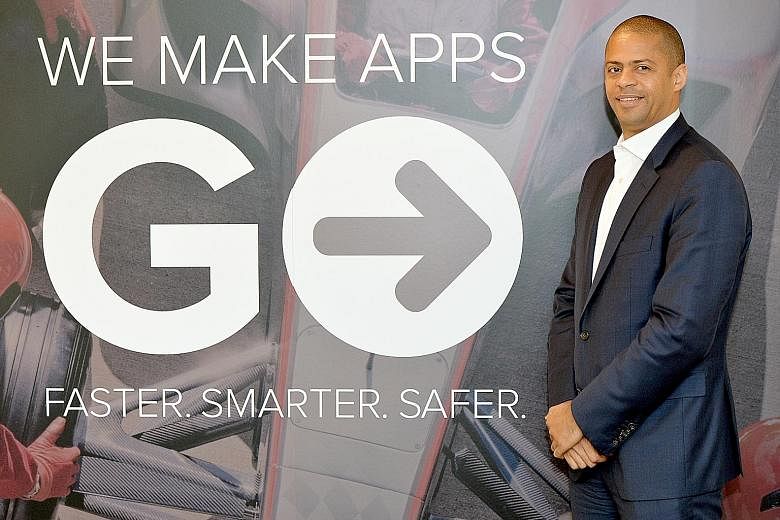These days when so much of our lives is spent on apps of every sort - from news to your mobile wallet - it would have made sense to focus a conversation with F5 Networks chief executive and president Francois Locoh-Donou on his firm, whose products make apps faster, smarter and safer.
Instead, I spent a good part of a morning with the Togolese-French, African-American IT executive on the subject of nuts, and Africa. Specifically, cashew nuts.
The cashew tree is a cash crop whose every part has value, from the wood to the fruit and even the shells of the nuts. The pricey nuts themselves have gained tremendous popularity in recent years for not only their taste but also their many health properties.
The top variety nut is called the "180" - meaning a pound, or 450g, of that sized cashew will have 180 nuts. The lowliest are "splits" and "brokens", used in cooking and confectionery. Cracking the shell without breaking the nut inside needs immense dexterity. While Africa is the top producer of the fruit, Vietnam and India are the top shellers of the nut, thus making a fortune in the value addition.
Thirteen years ago, Mr Locoh-Donou returned to his native Togo to set up West Africa's first cashew-processing company with a vision to alleviate rural poverty in the region. Cajou Espoir, or Cashew of Hope, began with one plant in Tchamba, and a promise to the mayor to employ 40 people in his town of 10,000.
It has since expanded to 800 employees across two units.
The firm sold its first container load to Europe in 2010 and two years later, began shipments to the United States.
"Unemployment in Tchamba used to be very high," says the 46-year-old Mr Locoh-Donou. "A lot of the women who work for us used to go to Benin and Liberia, officially to be maids but in a lot of cases, to be prostitutes. They used to come back with unwanted diseases and pregnancies. It used to just destroy the family tissue. Now, the women stay back in Tchamba."
Mr Locoh-Donou says his big insight from the experience was to observe the African chain of solidarity. People who used to earn the equivalent of US$10 (S$13.20) a month are now making six times that and enjoying the prosperity. More importantly, they share - US$10 sent to a destitute aunt who lives a hundred kilometres away, another US$10 spent on tuition for a child who can now focus on studies rather than doing odd jobs to supplement the family income, US$5 to a needy neighbour.
"If there is one thing Africa can teach the rest of the world of capitalism and free markets, it is that balance with family and societal solidarity," he says. "I see that in India as well - this notion of an extended family."
Born to a Togolese architect and a French mother who taught demography, Mr Locoh-Donou's identity is unabashedly mixed with his African heritage, even as his English is delivered with a soft French accent and he has three passports - US citizenship came recently.

"When I started working in technology and earned a salary, I was clear I wanted to create jobs and employment and also that I would do it in agriculture.To feed nine billion people on this planet, Africa's agriculture will have to go through a revolution. How much Africans contribute to this is up to us."
-
Fast facts
-
THE CEO
Mr Francois Locoh-Donou, 46, has been chief executive officer and president of F5 Networks since April last year.
He also co-founded cashew processing company Cajou Espoir, set up to help Togolese women make a good living.
Prior to this, Mr Locoh-Donou was chief operating officer and senior vice-president of Ciena Corporation, a company he served for 18 years.
Before joining Ciena, he worked as a development engineer with Photonetics (now GN Nettest), where he developed novel fibre-optic sensors for high-temperature environments.
He has also worked as a product manager at Level 3 Communications, focusing on the development of next-generation optical services.
Mr Locoh-Donou holds an MBA from Stanford University, a "mastere" in optical telecommunications from the National Institute of Telecommunications of Paris, and a "Diplome d'Ingenieur" in physics engineering from the National Institute of Physics in Marseilles, France.
Born in France to a French mother and a Togolese father, he spent his early years in Togo.
He and his wife, who is from Gabon, have three children - a boy and two girls.
THE COMPANY
F5 Networks, originally called F5 Labs, was set up in 1996. The company's name was inspired by the 1996 movie Twister, in which reference was made to the fastest and most powerful tornado on the Fujita scale: F5.
One of Seattle's most prominent publicly listed tech companies, F5 makes apps go faster, smarter and safer for the world's largest businesses, service providers, governments and consumer brands.
According to Forbes Global, F5 is in nine of the top 10 Asia-Pacific firms, all of the top 20 financial services and 16 of the top 17 telecom services firms in the region.
For fiscal year 2017, F5 had revenue of US$2.1 billion (S$2.8 billion).
It was with this in mind that, before Cajou Espoir, he tried another enterprise to serve rural Africa: a chicken factory. It brought back memories of the time there were chickens in the yard until his parents divorced when he was in his teens and he moved with his mother to suburban Paris.
While the chicken farm he set up with a boyhood friend eventually grew to 12,000 birds, he was frustrated that the enterprise generated only 30 to 40 jobs. All the money was going to buy feed. Besides, eggs were a luxury in Togo - people often buying a single egg at a time and consuming it furtively, away from the eyes of hungry children. So he closed the farm and turned to cashew.
"When companies are extractive and exploit people living in poverty, I see it as a form of violence," he says. "I see a lot of that in Africa. It is unhealthy and dangerous. My uneducated grandma used to tell me: 'Never eat to a full stomach in front of a hungry person.' That wisdom caused me to not just create jobs, but develop the community. So even those who don't work in the factory know it is a social enterprise and development engine for the community."
Cajou Espoir has financed benches in schools and created a medical facility in Tchamba. This year, it will bring electricity to a nearby village, thus living up to the "espoir" - or hope - in the name.
How does he juggle all this with his day job? Mr Locoh-Donou says he has an understanding with the board of F5 Networks that he will spend two weeks in a year on Cajou Espoir and on his own time. So far, the going has been smooth.
It has been nearly a year since he moved cross-country to Seattle, leaving telecoms company Ciena, where he had spent the best part of two decades, to join F5, his first shot at being a company CEO.
Unlike Ciena, F5, named after the most powerful category of tornado, is more of an information technology company. A market leader in its field and comfortably profitable, F5 turns over a little more than US$2 billion a year serving top names in telecommunications, banking and a variety of other fields. Its products sit between an individual and servers.
An online transaction request to an app, for instance, does not go directly to the bank but to F5 software that will examine the request, ensure it is a legitimate one, then manipulate it to ensure the app delivers the best result.
Given the explosion in apps, a long tunnel of business ought to be in view. But growth is slowing in the older, still-profitable businesses and the company needs to fully embrace the cloud era or risk going the way of Polaroid's film business.
How have the 10 months gone by? "There was a question around what F5 was going to be in future," he says. "I think I have been able to bring this clarity. Once that was in place, the next task was to set priorities and execution milestones and accelerate on the most important growth opportunities. Third, I brought in fresh blood, executives with global perspective, hired from other tech companies. This also helps in intensifying execution."
The most recent results show F5 revenue up 5 per cent on the year.
Mr Locoh-Donou says he is driving F5 with the aim of "removing the friction from consuming technology" because the easier it is for people to consume it, the more likely people will consume it.
"Until five months ago, if you wanted to buy from F5, you needed to buy a perpetual licence. Today, F5 offers subscription models. If you don't use, you don't pay. All of this is to remove the friction of consuming the technology."
Meanwhile, research and development centres in the US West Coast, Israel, Poland and, most recently, Hyderabad in India, regularly update the product line.
Mr Locoh-Donou is also intensely focused on diversity within the company, including racial and gender diversity.
Growing up in patriarchal Togo, his mother nevertheless infused in her three children a firm sense of gender equality, and he has carried that into his career.
Given his Afro-European lineage and recent citizenship of the US, it was impossible to avoid asking what he thought of US President Donald Trump's reportedly dismal view of African nations.
He pondered his response for a long moment. "There is Trump and there is America and I do not think the two are always the same thing," he says, noting that his association with the US runs to two decades and it indeed is hurtful that the President has this view of Africa.
"My experience of America before and after Trump is of a nation that welcomes immigrants and has made it easy for immigrants like me to enjoy the American dream. My career is a result of great mentors, either Americans or first-time immigrants. My experience has been one of inclusion, even where I live, which is on Mercer Island."
Like many African kids, Mr Locoh-Donou grew up with dreams of being an international footballer, worshipping the likes of Mali-born, French midfielder Jean Tigana and George Weah, a striker who has risen to be President of Liberia.
Mr Locoh-Donou and his Gabon-born wife have a boy and two girls. I asked him what he does in his spare time, and it isn't much unlike a Singaporean parent: ferrying the kids to activities over the weekend, trying to squeeze in a game of football and a date with the wife. He also tries to keep an eye on the cashew business.
"In my day you played football out of sight, fearing you'd get a scolding from dad," he muses. "These days, dads drive kids up to the football ground."


